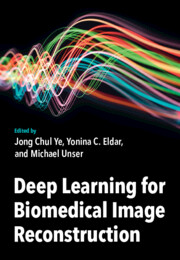Book contents
- Frontmatter
- Dedication
- Contents
- List of Contributors
- Preface
- Part I Theory of Deep Learning for Image Reconstruction
- Part II Deep-Learning Architecture for Various Imaging Architectures
- Part III Generative Models for Biomedical Imaging
- 12 Image Synthesis in Multi-Contrast MRI with Generative Adversarial Networks
- 13 Regularizing Deep-Neural-Network Paradigm for the Reconstruction of Dynamic Magnetic Resonance Images
- 14 Regularizing Neural Network for Phase Unwrapping
12 - Image Synthesis in Multi-Contrast MRI with Generative Adversarial Networks
from Part III - Generative Models for Biomedical Imaging
Published online by Cambridge University Press: 15 September 2023
- Frontmatter
- Dedication
- Contents
- List of Contributors
- Preface
- Part I Theory of Deep Learning for Image Reconstruction
- Part II Deep-Learning Architecture for Various Imaging Architectures
- Part III Generative Models for Biomedical Imaging
- 12 Image Synthesis in Multi-Contrast MRI with Generative Adversarial Networks
- 13 Regularizing Deep-Neural-Network Paradigm for the Reconstruction of Dynamic Magnetic Resonance Images
- 14 Regularizing Neural Network for Phase Unwrapping
Summary
From unconditional synthesis to conditional synthesis, GANs have shown that they are a perfect fit for such problems thanks to their ability to learn probability distributions. For unconditional synthesis, the objective is to stochastically generate MR images of target contrast. Conditional synthesis refers to the case where the model learns nonlinear mapping to the different MR tissue contrasts without altering the physiological information. Furthermore, by merging collaborative information of multiple contrast images, missing data imputation among many different domains is also effectively solved with GANs. Although promising results are seen, development in the area is still at its early stage. Interesting research directions are proposed from prior work, including the application of more advanced methods and rigorous validation in clinical settings. In effect, MRI image synthesis techniques should be able to reduce the burden of costly MR scans, benefiting both patients and hospitals.
- Type
- Chapter
- Information
- Deep Learning for Biomedical Image Reconstruction , pp. 279 - 298Publisher: Cambridge University PressPrint publication year: 2023

